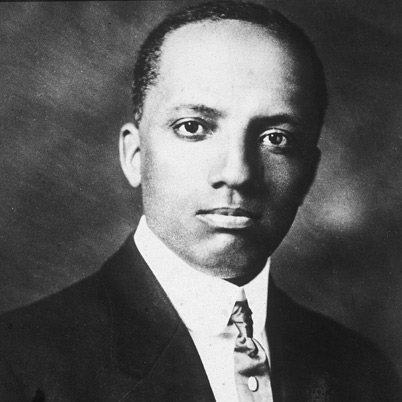 Carter G. Woodson was born in 1875 in New Canton, Virginia. He was the son of freed slaves, and worked as a sharecropper to help his family. One of the first African-Americans to receive a doctorate from Harvard, Woodson dedicated his career to the field of African American history, and lobbied extensively to establish Black History Month as a nationwide institution. He died in 1950.
Carter G. Woodson was born in 1875 in New Canton, Virginia. He was the son of freed slaves, and worked as a sharecropper to help his family. One of the first African-Americans to receive a doctorate from Harvard, Woodson dedicated his career to the field of African American history, and lobbied extensively to establish Black History Month as a nationwide institution. He died in 1950.
Historian, educator, author, and publisher. Born in 1875 in New Canton, Virginia. The son of freed slaves, Woodson worked as a sharecropper and a miner to help his family. He began high school in his late teens and proved to be an excellent student. Woodson went on to college and earned several degrees. He received a doctorate from Harvard University in 1912—becoming one of the first African Americans to earn a Ph.D. at the prestigious institution. After finishing his education, he dedicated himself to the field of African American history, working to make sure that this subject was taught in schools and was studied by scholars. For his efforts, Woodson is often known as the “Father of Black History.”
In 1915, Woodson helped found the Association for the Study of Negro Life and History (which later became the Association for the Study of Afro-American Life and History). The next year he established the Journal of Negro History, a scholarly publication. Woodson also formed the African-American-owned Associated Publishers Press in 1921, which produced several of his own works, including The Negro in Our History (1922) and Mis-Education of the Negro (1933).
Woodson lobbied schools and organizations to participate in a special program to encourage the study of African American history, which began in February 1926 with Negro History Week and was later expanded and renamed Black History Month. To help teachers with African American studies, he created the Negro History Bulletin in 1937. While Woodson died on April 3, 1950, his work continues on. Every February, students around the United States spend time learning about the subject closest to his heart—African American history.
Source: Biography

